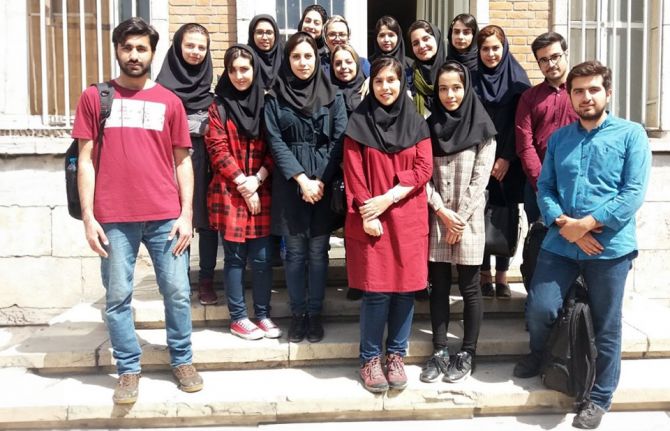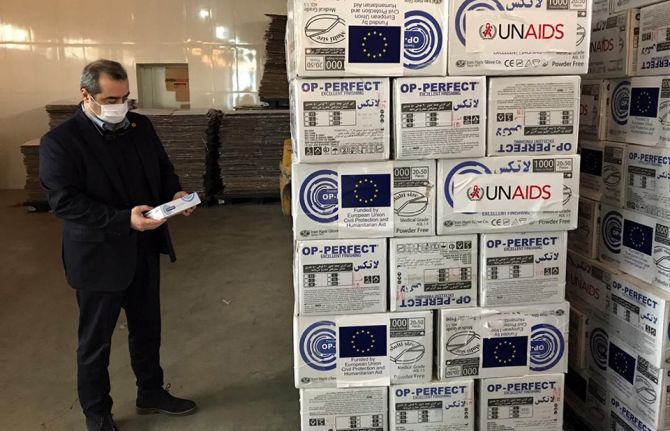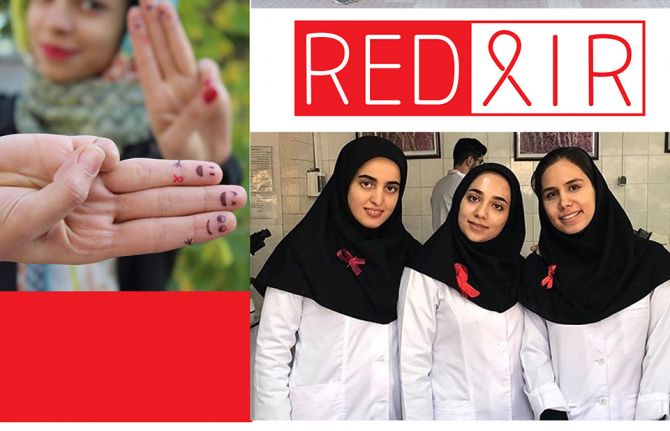IRN

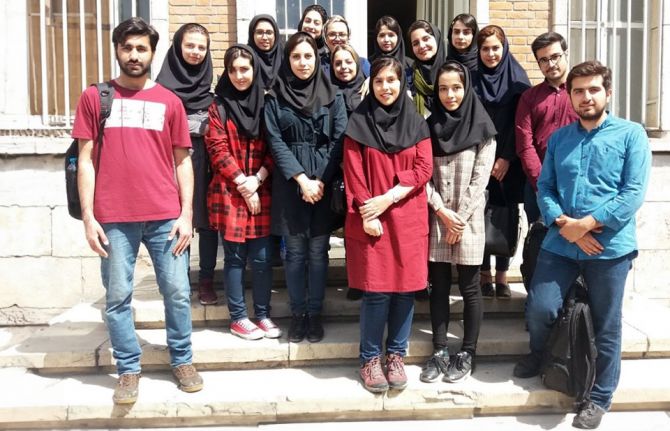
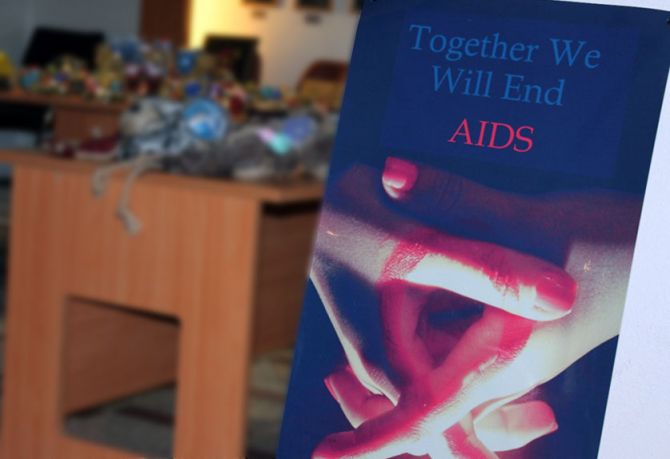
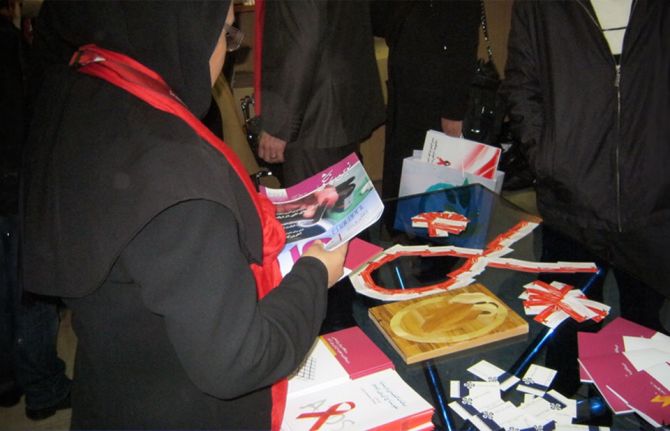
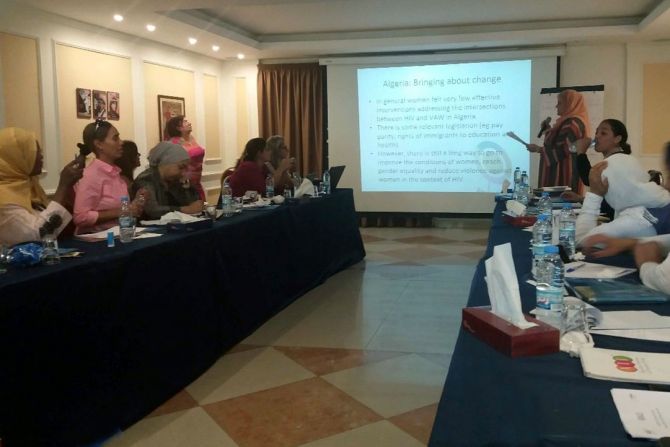
Feature Story
A transformative journey: Parisa's decades-long battle against HIV stigma and discrimination
18 July 2024
18 July 2024 18 July 2024Every pain yields a lesson, and every lesson transforms a person
Parisa's life was forever altered by HIV 25 years ago. The virus struck her family, snatching her husband's job and halting her child's education. Tragically, her husband passed away two years later, leaving Parisa to navigate the daunting landscape of loss and discrimination.
“I did not have a clue about this illness. It was, in fact, the first time I had even heard the word 'AIDS'”.
Undeterred by adversity, Parisa embarked on a relentless mission for human rights, determined to combat the pervasive stigma and discrimination surrounding HIV. Initially, she immersed herself in seminars and conferences, volunteering tirelessly at counselling centres, where she shared her own experiences to chip away at the stigma and discrimination.
“My activities in the Positive Club allowed me to broaden my knowledge and take more effective steps toward raising public awareness, reducing HIV stigma and discrimination, and helping my peers… IRCHA and UNAIDS supported me to expand my knowledge and gave me the chance to exchange my experiences with the members of Positive Clubs in and out of the country.”
Her unwavering dedication caught the attention of Dr Minoo Mohraz, the former director of the Iranian Research Centre for HIV/AIDS (IRCHA), who offered her a pivotal role in a Positive Club—a sanctuary for those grappling with similar challenges. Thus began Parisa's transformative journey, marked by a series of initiatives aimed at raising awareness, eradicating stigma and discrimination, and supporting her peers.
WHAT IS THE POSITIVE CLUB INITIATIVE? The Positive Club is a meeting place for people living with HIV, who run the club themselves, with supervision from Parisa and colleagues. At the club, people receive training in arts, and sports, and as peer educators. The Positive Club initiative was one of the successful programmes aimed at promoting positive health, dignity, and HIV prevention; it has been running for over 12 years with support from UNAIDS in collaboration with national partners and civil society organizations. Through this initiative, over 10,000 people living with HIV have been supported across 25 Positive Clubs, empowering them through training classes, workshops on HIV prevention, care and treatment, counselling sessions, and psychosocial support.
Over the years, Parisa's efforts have been nothing short of extraordinary. From managing a Positive Club in Tehran to representing people living with HIV in various influential platforms, including Iran's Country Coordinating Mechanism, its Oversight Committee, and Global Fund, she has been a relentless advocate for change.
Her initiatives have spanned diverse arenas, from radio shows and collaborations with filmmakers to training workshops for religious leaders and healthcare providers. Parisa's impact reverberates across borders, as she leverages regional platforms like MENA Rosa --the first regional network dedicated to women living with HIV in the Middle East and North Africa-- to exchange experiences and champion global efforts against HIV stigma and discrimination with a particular focus on Women living with and affected by HIV.
Amid the COVID-19 pandemic, Parisa's compassion for people living with and affected by HIV was once again evident. She mobilized support networks to provide essential supplies for Positive Club members and vulnerable families, ensuring that the crisis does not exacerbate the challenges faced by PLHIV.
Reflecting on the progress made over the last 25 years, Parisa acknowledged the remarkable strides in combating HIV-related stigma and discrimination. Efforts to eliminate HIV-related stigma and discrimination have been led by the UNAIDS Country Office for Iran, alongside national partners of the AIDS Control Programme. Notably, the first PLHIV Stigma Index study, conducted in 2010, laid the foundation for understanding the landscape of stigma in Iran. Subsequently, a second PLHIV Stigma Index study, was carried out by the network of PLHIV in collaboration with UNAIDS, Global Network of PLHIV (GNP+), International Community of Women Living with HIV (ICW), Johns Hopkins Medical University (JHMU), National AIDS Programme (NAP), and with financial support from Global Fund to Fight AIDS, Tuberculosis and Malaria (GFATM) /UNDP. Parisa played an important role in implementing the Stigma Index 2.0 which provided updated insights.
COMPARING OF BOTH OF IRAN’S STIGMA INDEX STUDIES A comparison between the two Stigma Index studies conducted ten years apart, using updated methodologies, revealed promising changes. The prevalence of self-stigma among PLHIV decreased significantly from 80% to 40%. Similarly, the percentage of PLHIV refraining from seeking medical help has decreased from 80% to 19%, underscoring improved accessibility to healthcare services and increased health-seeking behaviour among affected individuals. Overall, reports of stigma and discrimination have decreased from 71% to 47%, reflecting tangible improvements in societal attitudes to HIV.
Parisa reflects on these notable shifts in HIV-related Stigma observed between the two studies. In the initial Stigma Index conducted a decade ago, internal stigma was predominant among PLHIV, followed by societal and healthcare provider stigma. However, in the subsequent study, internal stigma was significantly reduced, while stigma and discrimination from healthcare providers emerged as the most prevalent issue. The improvement observed in internal stigma among PLHIV could be partly attributed to the work of the empowering Positive Clubs. Additionally, this improvement highlights the importance of ongoing efforts to address stigma and discrimination comprehensively, with a particular focus on healthcare settings. By acknowledging these shifts and persisting in their efforts, UNAIDS Iran, Parisa and her colleagues remain committed to building a future free from the burdens of HIV-related stigma and discrimination.
Through her nearly two decades of hotline counselling experience, Parisa has witnessed a shift in attitudes, with increased awareness and openness surrounding HIV discourse.
She credits grassroots campaigns and community-led initiatives for driving this transformation, paving the way for a more inclusive society.
“Positive Clubs have been played a very effective role in empowerment and phycological support to the members and reducing stigma and discrimination.”
In 2019, Iran joined the Global Partnership to Eliminate all forms of HIV-related stigma and discrimination, prioritizing a strong emphasis on interventions within communities, emergency/humanitarian settings, and healthcare facilities. With support from UNAIDS, protocols and training packages were developed to address stigma and discrimination in these critical areas. These efforts were carried out in close collaboration with national partners and civil society organizations, with training workshops being a key component of the initiative.
OVERVIEW OF GLOBAL PARTNERSHIP The Global Partnership for action to eliminate all forms of HIV-related stigma and discrimination is a critical vehicle for action to mobilise all countries to reach the political declaration and Global AIDS Strategy targets. It leverages partnerships to enhance coordination of interventions and funding; it provides knowledge and evidence-guided technical support; and increases accountability mechanisms and community leadership.
Parisa was actively involved in the implementation phase of these projects. Her contributions have been instrumental in advancing the work to eradicate HIV-related stigma and discrimination across humanitarian, healthcare, and community settings.
However, Parisa acknowledges the persistent challenges faced by PLHIV, from sporadic bouts of self-doubt to occasional rejections and the lingering shadows of depression and fear. Despite these hurdles, she remains steadfast in her belief that we can achieve a future free from stigma and discrimination.
As Parisa continues her tireless advocacy, her journey stands as a testament to the resilience of the human spirit and the power of collective action in fostering a world where every individual, regardless of their HIV status, is embraced with dignity and compassion.
“Of course, people living with HIV still experience stigma and discrimination at different stages of their lives but have a hope for a day free of stigma and discrimination.”
UNAIDS has played a pivotal role in the establishment and sustained operation of Positive Clubs for over a decade, catalyzing transformative changes in the lives of people living with HIV such as Parisa and in the fight against stigma and discrimination. Nonetheless, the journey towards eliminating stigma and discrimination remains unfinished, albeit considerably smoother and more steadfast with the collaborative efforts and political commitment of initiatives such as the Global Partnership.
“Together, we continue to pave the way towards a future free from the burdens of stigma and discrimination for all individuals living with and affected by HIV.”
Related
 U=U can help end HIV stigma and discrimination. Here’s how
U=U can help end HIV stigma and discrimination. Here’s how

27 February 2025
 Status of HIV Programmes in Indonesia
Status of HIV Programmes in Indonesia

24 February 2025

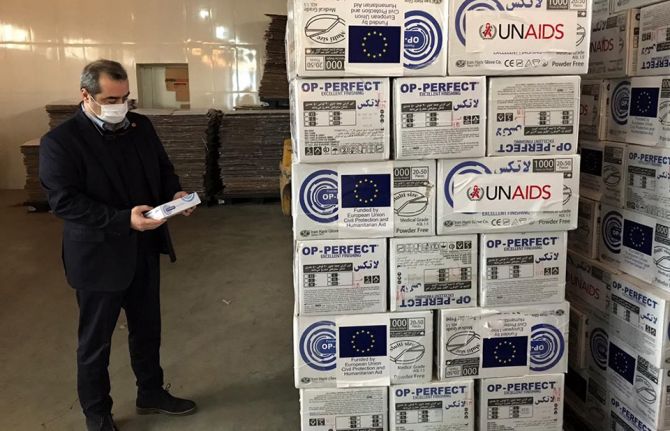
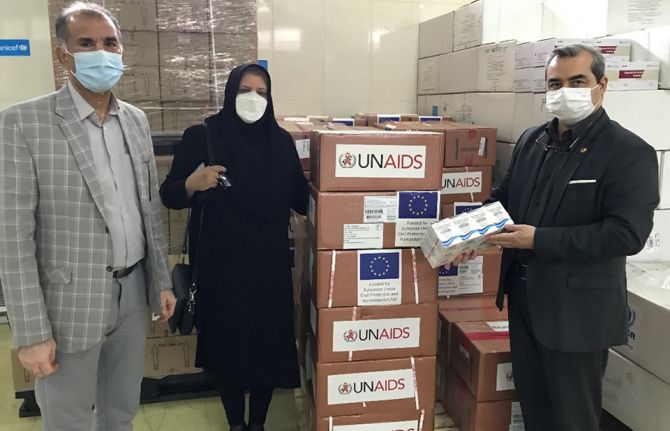
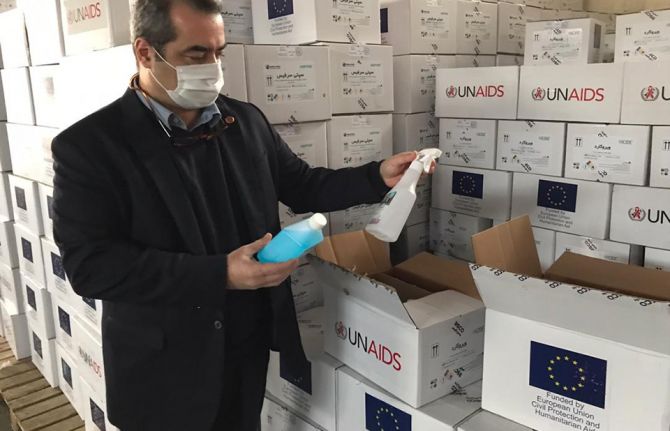
Feature Story
How UNAIDS helped in the response to COVID-19 in the Islamic Republic of Iran
08 June 2022
08 June 2022 08 June 2022From the beginning of the COVID-19 pandemic, it was clear that life would be even more difficult for people living with HIV.
“When experts identified how COVID-19 affected people, it was clear that people with compromised immune systems needed to get a heightened level of care and attention,” said Fardad Doroudi, the UNAIDS Country Director for the Islamic Republic of Iran. “We needed to be quick and agile to mobilize our resources and expertise to make sure that no person living with HIV was left behind.”
Throughout the multiple waves of COVID-19 in the country, UNAIDS has provided critical support to people living with and affected by HIV, providing personal protective equipment and medicines, supporting nongovernmental organizations with small grants to help communities, developing information, education and communication materials and developing a community-based monitoring and evaluation framework.
Personal protective equipment, such as masks, shields, gloves and sanitizer, is a key tool in preventing the spread of viruses such as the virus that causes COVID-19. UNAIDS provided 95 tonnes of personal protective equipment to the Ministry of Health and Medical Education and the State Welfare Organization to be distributed through HIV-related nongovernmental organizations. Items provided included 1.8 million face masks, 60 000 bottles of hand sanitizer and 40 000 boxes of latex gloves, among other equipment.
Multimonth dispensing, ensuring that people living with HIV who are on HIV treatment receive enough treatment to last several months in order to avoid frequent visits to health centres, is a key pillar of an HIV response in humanitarian crises and was at the centre of UNAIDS’ efforts during the pandemic in the Islamic Republic of Iran.
To ensure that people on HIV treatment received their life-saving medicines, UNAIDS procured and delivered more than 650 000 doses of Vonavir, which covered the needs of more than 7000 people living with HIV for nearly three months, and more than 520 000 doses of Truvada, which covered the needs of nearly 3000 people living with HIV for six months. The more than 10 000 people helped with treatment received their medicines through treatment centres across the country.
Ten nongovernmental organizations working on HIV were awarded 26 small grants to increase community engagement and help people living with HIV adapt to life during the COVID-19 pandemic, and reached more than 14 000 people. Some of the activities funded by the grants include income generation schemes, home-care services, online sales and commerce, mental health support, the development of e-learning platforms, the distribution of hygiene kits, food and medicines and holding virtual events and forums for awareness-raising and stress reduction.
UNAIDS also helped in creating impactful information, education and communication material to enhance knowledge and build awareness of the COVID-19 pandemic. In collaboration with the national AIDS programme, UNAIDS supported the production and dissemination of a series of animations by a local nongovernmental organization. The 16-minute animation series, split into three episodes, covers topics such as the basics of HIV in relation to COVID-19, prevention of the virus in the context of HIV, the importance of continuing HIV treatment and addressing stigma and discrimination. The videos were featured across a number of online channels and platforms, receiving more than 15 000 views to date.
UNAIDS also developed and piloted a community-based monitoring and evaluation framework. This was born out of field monitoring activities carried out together with government partners and civil society organizations.
Online training sessions were organized for more than 200 people living with HIV and service providers. The sessions covered the basics of monitoring and evaluation of HIV-related COVID-19 programmes for nongovernmental organizations. The goal was to improve the effectiveness of monitoring and evaluation practices for HIV within the framework of the national strategic plan in order to improve the quality of HIV programmes in the country.
“Relying on strong collaborations and partnerships was key for our fast response during a rapidly changing time,” said Mr Doroudi. “With the support of donors, a strong liaison with national counterparts and effective collaboration with other United Nations agencies, we managed to be a part of the overall support to people living with HIV, who had to deal with the health, social and economic challenges associated with the COVID-19 pandemic.”
UNAIDS’ response to COVID-19 in the Islamic Republic of Iran was funded by the European Union’s humanitarian aid budget and was facilitated in partnership with the United Nations Children’s Fund. The Islamic Republic of Iran’s Ministry of Health and Medical Education and the State Welfare Organization were the key governmental partners for the wide range of activities undertaken as part of the project.
Region/country
Related
 Status of HIV Programmes in Indonesia
Status of HIV Programmes in Indonesia

24 February 2025

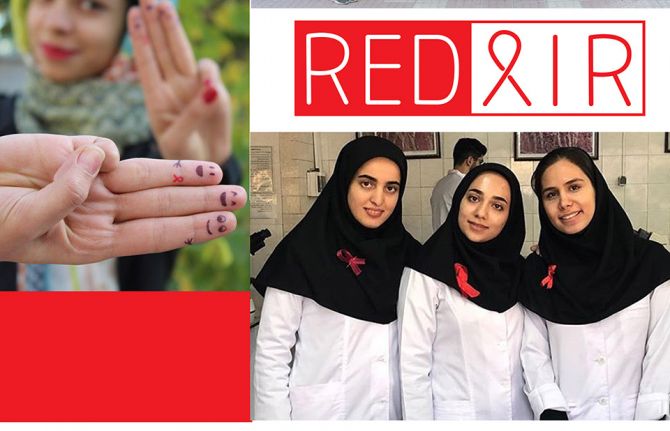
Feature Story
Online games fighting HIV stigma and discrimination in the Islamic Republic of Iran
16 June 2020
16 June 2020 16 June 2020The UNAIDS Country Office for the Islamic Republic of Iran and the country’s branch of the International Federation of Medical Students’ Associations have been collaborating on new ways of making an impact on the national AIDS response since 2013.
In the past, the collaborations have included public awareness campaigns, educational workshops, field visits and week-long summer schools open to health-care students.
“The summer schools were more than inspiring, they made us confident about our next area of focus: acting against HIV-related stigma and discrimination,” said Aidin Parnia, one of the founders of the summer schools and of the Avecene Consultancy.
Started by people who had attended the summer schools, the Avecene Consultancy was formed to mobilize the accumulated knowledge and experience of the summer schools and to combine them with modern and up-to-date educational developments. The result is the REDXIR educational online platform, which uses games to change the attitude and behaviour of health-care students in order to bring about a future generation of discrimination-free health-care professionals.
Set in an imaginary world where the players are a young group that battles a mysterious enemy that symbolizes HIV-related stigma and discrimination, the goal of REDXIR is to fight back and defeat stigma and discrimination.
The 10 levels of the game are designed to challenge the students’ knowledge of HIV and their attitude and behaviour towards people living with the virus. For example, in the Blood Pressure level of the game, the students have to take the blood pressure of a person living with HIV to show that he or she can do so without discrimination. At higher levels, they should be able to take a blood sugar test and a blood sample for a routine laboratory test.
While some of the levels are performed virtually, others need action to be taken in the real world. For example, in the Do Not Be Silent level, the students must recognize discriminatory posts on social media, post #Zerodiscrimination below at least one of the social media feeds they see and comment on the reason why the content is discriminatory. In the Campaign level, the students participate as trainers in an HIV awareness campaign.
“New generations need new platforms. REDXIR, through its user-friendly approach where students are in direct contact with the target populations, has proved to be an effective way to help eliminate HIV-related stigma and discrimination in health-care settings,” said Parvin Kazerouni, the Head of the HIV Control Department of the Center for Communicable Disease Control of the Iranian Ministry of Health and Medical Education and the National AIDS Manager.
“REDXIR shows how creative and innovative approaches can embrace and support the novel ideas of young people to address issues such as stigma and discrimination,” said Fardad Doroudi, the UNAIDS Country Director for the Islamic Republic of Iran.
The UNAIDS country office provided technical and financial support for REDXIR.
Region/country
Related
 Status of HIV Programmes in Indonesia
Status of HIV Programmes in Indonesia

24 February 2025

Feature Story
UNAIDS Executive Director praises Iran’s evidence-informed approach to HIV in prison settings
13 October 2010
13 October 2010 13 October 2010
Michel Sidibé meets with H.E. Mohammad Reza Rahimi, First Vice President of the Islamic Republic of Iran. Credit: UNAIDS
In nearly all countries, HIV prevalence among prisoners is significantly higher than in general population. A variety of factors contribute to the spread of HIV in prison settings, including unsafe injecting drug use, unprotected sex, tattooing with contaminated equipment and poor prison health services.
In the Islamic Republic of Iran, HIV prevalence among prisoners is about eight times higher than in the general population. Injecting drug use is the main mode of HIV transmission, accounting for more than 70% of reported HIV cases in Iran.
A visit this week to Iran by UNAIDS Executive Director Michel Sidibé highlighted the country’s progressive work in addressing its HIV epidemic in prisons and among people who inject drugs. Iran’s 250 prisons, rehabilitation camps and juvenile correctional centers house approximately 180 000 inmates. Nearly half of all inmates are imprisoned on drug-related charges.
“What I saw in Qezel Hessar Prison is an evidence-based approach marked by tolerance, pragmatism and compassion,” said Mr Sidibé after touring the largest detention center in the region. “I am impressed with the comprehensive package of HIV prevention, treatment, care and psychosocial support that the prison provides.”
Located near Karaj City, the Qezel Hessar Prison has 19 000 inmates, the majority incarcerated on drug-related offences. The facility offers a wide range of HIV-related services, including opioid substitution therapy, antiretroviral therapy, voluntary testing and counselling, access to condoms and sterile razors, psychotherapy and other behavioral interventions.
Qezel Hessar Prison provides methadone maintenance therapy to more than 2700 inmates on a daily basis, a 30-fold increase since 2003. Like most other prisons in country, married prisoners are allowed conjugal visits with their spouses and are provided with private rooms and condoms.
Executive Director meets senior Iranian officials and people living with HIV

Michel Sidibé meets with a group of HIV-positive people at the "Positive Club" in the Iranian Research Center for HIV and AIDS. Credit: UNAIDS
In meetings with First Vice President Mohammad-Reza Rahimi and other top Iranian officials, Mr Sidibé urged authorities to work towards the goals of “zero new HIV infections among drug users” and “zero newborns with HIV.” Iranian authorities expressed the commitment of the Islamic Republic of Iran to address the HIV epidemic based on the Islamic concept, “If you save one life, you are saving humanity.”
As part of his official mission, Mr Sidibé also visited a “Positive Club” located in the Iranian Research Center on HIV and AIDS. Addressing a group of people living with HIV, he said: “When I hear the words “hope,” “happiness” and “job,” I feel that our efforts have not been wasted.”
During the visit, Mr Sidibé emphasized the work of Iranian health authorities in helping restore the lives and dignity of people living with HIV through the establishment of such Positive Clubs and the provision of information, antiretroviral medicines and other HIV-related services.
Speaking on behalf of people living with HIV, the head of the Positive Club’s council told Mr Sidibé that AIDS is a very difficult area to address. “It requires courage and patience, and you are one of those people who have the courage and patience to work in this area,” he said. “We are happy to have your support, and we are ready to work with you together.”
Region/country
Related
 Status of HIV Programmes in Indonesia
Status of HIV Programmes in Indonesia

24 February 2025

Feature Story
UNODC and Iran sign agreements to reduce vulnerability of women and Afghan refugees to drugs and HIV
24 March 2009
24 March 2009 24 March 2009This story was first published on UNODC.org
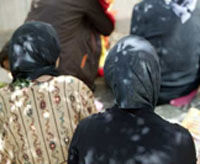
Women in Iran. Credit: UNAIDS/P. Virot
The Executive Director of the United Nations Office on Drugs and Crime (UNODC), Antonio Maria Costa, and the Deputy Secretary General of the Islamic Republic of Iran's Drug Control Headquarters, Taha Taheri signed, on 19 March, two projects to provide HIV prevention and care services to Afghan refugees and female drug users in Iran. These projects will be launched thanks to funding from the Government of the Netherlands.
The goal of the first project is to support national efforts to provide comprehensive HIV prevention and care services to Afghan refugees in Iran who are drug users. This is part of a sub-regional project also targeting Afghan drug-dependent refugees in Pakistan as well as those who have returned to Afghanistan. UNODC, in association with the United Nations High Commissioner for Refugees, UNAIDS and the International Organization for Migration, will assist in delivering comprehensive HIV prevention, treatment, care and support services to Afghan refugees under this initiative. The Governments of Afghanistan and Pakistan will also be part of this three-year project.
The hardships of Afghan refugees are compounded, not solved, by drugs. We need to reach out to this vulnerable group, and lower their vulnerability to drug abuse and the spread of HIV/AIDS through injecting drug use.
Antonio Maria Costa, Executive Director of the United Nations Office on Drugs and Crime (UNODC)
According to the latest information, there are more than 900,000 Afghan refugees in Iran, down from a peak of 2 million in 2002/03. This is one of the largest refugee populations in the world. "The hardships of Afghan refugees are compounded, not solved, by drugs. We need to reach out to this vulnerable group, and lower their vulnerability to drug abuse and the spread of HIV/AIDS through injecting drug use", said Mr. Costa. This group has been identified as being high-risk, yet has thus far not fully benefited from Iran's large-scale comprehensive HIV prevention, treatment, care and support services to injecting drug users - including opioid substitution treatment.
The second project targets another vulnerable group; Iranian women who are either drug dependent and/or affected by HIV. The aim of the project is to increase access to quality services tailored to the specific needs of these women, including in prison settings. This will complement the significant resources that the Government of Iran already devotes to prevention and treatment of HIV as well as drug demand reduction measures.
"These agreements are further evidence of UNODC's pro-health approach to drugs, and to a deepening of our partnership with the Islamic Republic of Iran," said Mr. Costa. "UNODC is grateful for the financial assistance from the Netherlands". He urged other funding partners to follow suit and reduce the vulnerability of women and Afghan refugees in Iran to drugs and HIV. "This is an often neglected and humanitarian side of drug control", said the head of UNODC.
Right Hand Content
Cosponsors:
Press centre:
High Commissioner calls for focus on human rights and harm reduction in international drug policy (10 March 2009)
Feature stories:
OPINION: Silence on harm reduction not an option (11 March 2009)
Injecting drug use and HIV: Interview with UNAIDS Team Leader, Prevention, Care and Support team (11 March 2009)
51st session of the Commission on Narcotic Drugs (11 March 2008)
Injecting drug use: focused HIV prevention works (11 May 2007)
Speeches:
“Why we need harm reduction to reach universal access goals” Speech by Michel Sidibé, Executive Director of UNAIDS to Donor Conference Harm Reduction, Amsterdam (28 January 2009) (pdf, 100 Kb)
Publications:
Best Practice Publication: High Coverage Sites (pdf, 1,57 Mb)
Iran UNGASS Country Progress Report 2008 ( en | Persian ) (pdf, 531 Kb | 2,59 Mb )
Region/country
Related
 Status of HIV Programmes in Indonesia
Status of HIV Programmes in Indonesia

24 February 2025

Feature Story
Joint Islamic action to respond to AIDS
10 March 2009
10 March 2009 10 March 2009
The Islamic Conference of Health Ministers (ICHM) brought together representatives from 57 member countries from 1 – 4 March in the I.R. of Iran. Credit: ICHM
The Islamic Republic of Iran hosted the second session of the Islamic Conference of Health Ministers (ICHM) bringing together representatives from 57 member countries from 1 – 4 March to discuss health issues facing the Islamic community under the theme "Health Equity in the Islamic Ummah."
The aim of the conference was to formulate concrete proposals in addressing health issues through initiating a “Health Vision” for the Organization of the Islamic Conference (OIC), as well as to review the implementation and progress made on the decisions and recommendations of the First Islamic conference of Ministers of Health held in Kuala Lumpur, Malaysia in 2007.
“Policy makers in the area of health should adopt a comprehensive strategy towards health issues. A strategy which considers health as the focus of development, where health is evaluated in a broad sense from physical to psychological, social, and spiritual health,” said H.E Professor Lankarani Minister of Health and Medical Education of I.R. Iran, during the opening of the meeting.
In relation to combating communicable diseases, it was noted with deep concern in the resolution adopted by the ministers on this subject, that AIDS is a crisis with disastrous consequences for the social and economic progress of all nations, including Muslim countries. The resolution urged OIC member states to foster HIV prevention programmes in cooperation with, among others, UNAIDS, WHO and the Global Fund. Such programs shall be formulated and implemented with full respect for Islamic, Cultural, Ethical and Social values of OIC member states.
"Ensuring universal access to HIV prevention, treatment, care and support is the cornerstone to reverse the HIV epidemic."
Renu Chahil-Graf, Director, UNAIDS Regional Support Team for Middle East and North Africa
There is no single HIV epidemic among the 57 OIC member countries. While the number of reported infections is on the rise in some countries and stable in others, higher HIV prevalence rates are documented among specific populations and settings within a number of countries. This is compounded by wider socioeconomic dynamics, such as changing lifestyles of young people, socio-political instability and conflict, gender inequality and mobility, factors that can increase vulnerability to HIV infection.
“Ensuring universal access to HIV prevention, treatment, care and support is the cornerstone to reverse the HIV epidemic,” said Renu Chahil-Graf, Director, UNAIDS Regional Support Team for Middle East and North Africa. “The opportunities afforded by the drive to universal access must be seized to ensure access to all essential commodities, gender equality, human rights, progress on all Millennium Development Goals and primary health care for all.”
The final resolution adopted by the OIC invites its member states and the OIC General Secretariat to contribute to the global response to AIDS in the context of international cooperation and partnership, and by actively sharing and disseminating the common Islamic vision and approach in responding to the HIV epidemic.
The OIC brings together 57 Member States inhabited by almost 1.5 billion people and spread over four continents in Asia, Africa, Europe and South America. The efforts of the OIC are mainly aimed at crystallizing a Joint Islamic Action to ensure, safeguard and protect the interests of the Muslim world. Since the 3rd Extraordinary Summit in Makkah Al-Mukarramah in 2005, whereby a Ten-Year Programme of Action was formulated, developmental targets in various domains including Health were set. For example, the Summit strongly called for combating pandemics and eradicating diseases and epidemics such as AIDS, Malaria, Polio and Tuberculosis.
Joint Islamic action to respond to AIDS
Region/country
Related
 Status of HIV Programmes in Indonesia
Status of HIV Programmes in Indonesia

24 February 2025

Feature Story
Making a difference: UNAIDS in Iran
13 May 2008
13 May 2008 13 May 2008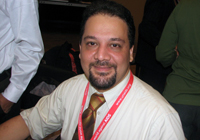
Hamid Reza Setayesh is UNAIDS Country
Coordinator in Iran.
HamidReza Setayesh became the UNAIDS Country Coordinator (UCC) when the UNAIDS Iran office was established in March 2005. Like most UNAIDS Country Coordinators Setayesh’s time is filled with the major task of coordinating the UN response on AIDS in the country. In Iran there are 13 UN offices that make up the Joint UN Team on AIDS, which he chairs. In addition to this, the UNAIDS office also provides technical support to the government and non-governmental organizations (NGOs) as it is considered a trusted and reliable partner.
“Our greatest achievement has been the harmonisation of the UN response to AIDS,” says Setayesh. “We were able to move forward and I am very satisfied with that.” Other important achievements in his three years of office are in the area of improving strategic information, where the country lacks sufficient capability. UNAIDS has assisted the government in designing small studies which provide the evidence for successful interventions.
The major factor which is fuelling the epidemic in Iran is the use of contaminated injecting equipment among injecting drug users, as well as sexual transmission of the disease. Therefore, the work of the Joint UN Team on AIDS is primarily focused on the issue of injecting drug use, “It is our top priority to advocate with the government to allocate resources towards harm reduction interventions,” says Setayesh. According to the United Nations Office on Drugs and Crime (UNODC), there are an estimated 200,000 injecting drug users in the country, considerable proportion of whom are using crystal-base heroin which is known in the market as “crack”.
This work has been successful and the Iranian government has one of the most progressive harm reduction policies on record in a developing country. There are more than 20,000 drug users on the government methadone maintenance programme, which began three years ago. Important legal reforms have facilitated the success of this programme: although drug use is a crime, people who are having treatment for drug use are not considered criminals. “Even needle and syringe programmes can be considered treatment, which is a very big achievement and an important step to de-stigmatise and make services available to people who inject drugs,” says Setayesh. Based on the most recent available studies, more than 90 percent of drug users have used clean needles for their last injection in Tehran.
Two years ago the drug treatment programme was extended to prisons where the United Nations Office on Drugs and Crime (UNODC) is the main partner. “A lot has been done but there is room for improvement,” says Setayesh. “Prison systems are trying to introduce needle exchange and condoms, but it is a challenge to encourage the prisoners to use them. This requires reform to expand services in prisons. “
Nonetheless, Iran is moving from having a concentrated HIV epidemic among injecting drug users to a more generalized situation, mainly affecting partners and wives of people who inject drugs and people formerly in prison. Although the response among these particular key populations has been remarkable and progressive, other groups who engage in risky behaviour such as sex workers and men who have sex with men are not sufficiently addressed in the country's response. Homosexuality is a sensitive issue in Iran and providing services for men who have sex with men presents many challenges for UNAIDS, which is the leading UN programme in this area.
As in many other countries, it is stigma that is the major obstacle to the AIDS response in Iran. “This is found at different levels,” says Setayesh, “although we get a lot of support from communities, from government and partners, it is still a challenge.”
There is also difficulty in getting funding for innovative ideas to challenge stigma. “Though the government is committed, they spend a lot of money on methadone substitution and harm reduction. When you want to work with other groups, the government is less interested and there is no donor support,” says Setayesh. “Radio and television are not that interested in openly addressing stigma, particularly with regard to sexual transmission. They are much better with drugs.”
The Joint UN Team has worked on identifying major sources of stigma and on a novel approach to combat it. They approached high level religious leaders who supported the principle that people living with HIV should not be discriminated against and that public funds should be allocated for their health care. “This helped people living with HIV to express themselves and has put a face to HIV.” In addition, a new strategy, “Positive Prevention” is being developed by National AIDS Programme through supports from UNAIDS and UNDP.
Setayesh is upbeat about the prospects for Iran’s AIDS response. “I think everything is possible in this country,” he says. “It’s very progressive in many aspects, and the government’s work is based on evidence. That provides a very good opportunity for us to convince policy-makers to do more for public health.” With these attitudes Setayesh believes it may be possible to turn the epidemic around. There is already evidence that the methadone substitution programme is having an impact, with decreased prevalence in prisons. “We hope to see results in two years time,” he says. “And that will remarkably affect the community outside because of the linkages between drugs and sex work. So this is a golden opportunity that has already been used and I hope continues.”
Making a difference: UNAIDS in Iran
Feature stories:
Making a difference: Jamaica (14 March 2008)
Making a difference: UNAIDS in Ethiopia (8 February 2008)
Making a difference: UNAIDS in Ukraine (8 January 2008)
Addressing HIV and drug use in the Middle East and North Africa (03 November 2006)
Publications:
Middle East and North Africa Regional Summary 2007 AIDS epidemic update (pdf, 175K)






